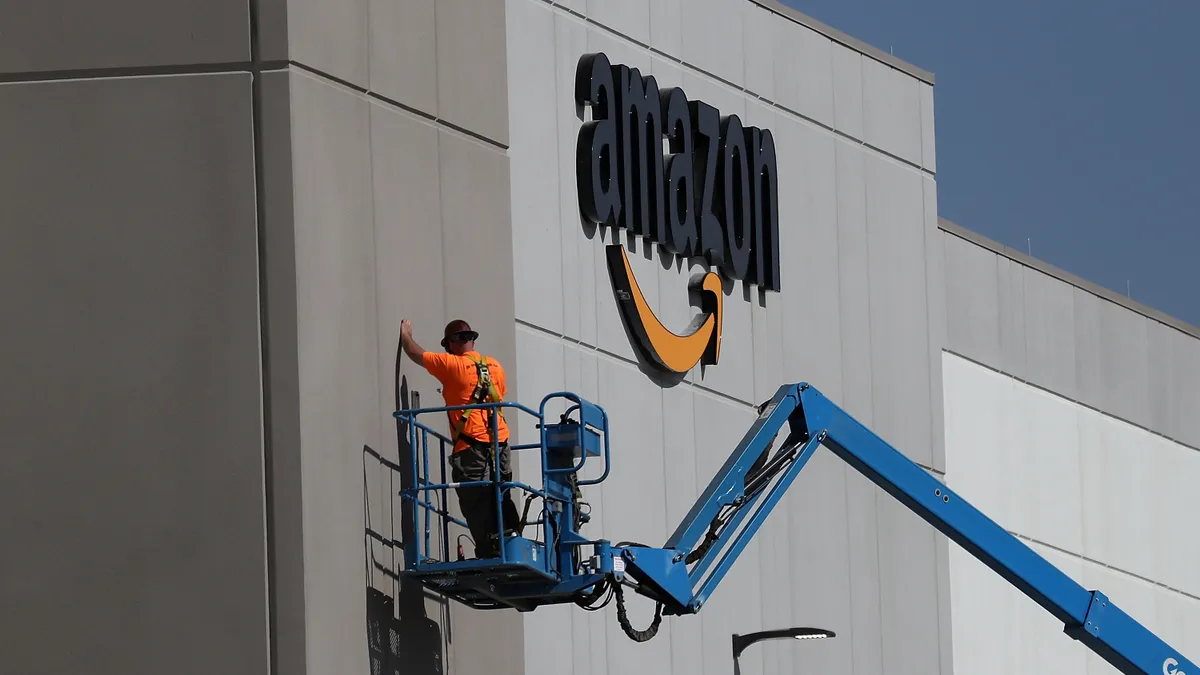UPDATE: March 21, 2022: A federal judge dismissed a lawsuit filed by Washington D.C.'s attorney general against Amazon over allegations of price fixing last week, according to a note on the D.C. Superior Court docket.
In an emailed statement, a spokesperson for D.C. Attorney General Karl Racine's office said that the office is considering its legal options after the ruling. "We believe that the Superior Court got this wrong, and its oral ruling did not seem to consider the detailed allegations in the complaint, the full scope of the anticompetitive agreements, the extensive briefing, and a recent decision of a federal court to allow a nearly identical lawsuit to move forward," the spokesperson said.
In seeking dismissal of the case, Amazon said in a court filing that D.C.'s complaint "fails to allege essential elements of an antitrust claim and, in any event, the conduct it attacks has been held by courts to be procompetitive."
Dive Brief:
- Washington, D.C., Attorney General Karl Racine filed an antitrust lawsuit against Amazon Tuesday over allegations that it fixed retail prices online through its third-party seller platform.
- In a complaint against the company, Racine's office took aim at a policy that blocked third-parties from selling at lower prices on other sites, including their own. Amazon dropped the policy in 2019 but replaced it with an "effectively-identical substitute," the attorney general alleges. The lawsuit seeks to end the price agreements, recover damages and impose penalties on Amazon.
- "The DC Attorney General has it exactly backwards — sellers set their own prices for the products they offer in our store," an Amazon spokesperson said in an emailed statement. "Amazon takes pride in the fact that we offer low prices across the broadest selection, and like any store we reserve the right not to highlight offers to customers that are not priced competitively."
Dive Insight:
Over the years, Amazon's Marketplace has become a major force in e-commerce. Between 2008 and 2018, the share of Amazon's online sales made by independent sellers went from 30% to 58%. According to Marketplace Pulse, third-party sellers accounted for an estimated $295 billion worth of products sold over Amazon's site in 2020, a 47.5% year-over-year increase from 2019. No other marketplace in the U.S. is even close to that size.
The sheer scale of Amazon's site has opened doors for entrepreneurs and new "Amazon native" brands. But it also means Amazon has tremendous power as a marketplace platform. The complaint from D.C.'s attorney general puts Amazon's share, including its own and third-party sales, at between 50% and 70% of all online retail sales in the U.S. As a platform for sellers, Amazon's market share is even higher.
Whether the company has abused that position to maintain its market share and advance its interests will be the key question in any antitrust suit. Racine alleges that Amazon did abuse its power.
"Amazon’s online retail sales platform benefits from, and is protected by, Amazon’s anticompetitive business practices," the complaint alleges. "Far from enabling consumers to obtain the best products at the lowest prices, Amazon instead causes prices across the entire online retail sales market to be artificially inflated, both for products sold on Amazon’s online retail sales platform and on its competitors’ online retail sales platforms."
Racine's complaint states that even after Amazon, "under intense scrutiny" from Congress and antitrust enforcers, nixed its "price parity provision," the company quickly replaced it with new measures that allowed it to sanction sellers that offer products at better prices and terms on other sites. The complaint also states that Amazon can impose "a complex scheme of fees and extra charges" that can total 40% of a seller's product price and are "then passed on to customers not only on Amazon’s platform, but also on all other online retail platforms" because of the company's policies.
D.C.'s lawsuit could mark the beginning of an extended legal headache for Amazon over its competitive practices. Last year, the antitrust subcommittee of the Democrat-led House of Representatives issued a report on tech platforms that included Amazon, zeroing in on the company's relationship with its third-party sellers.
The report found that Amazon internally refers to sellers as "internal competitors" and that the company's dual role as online retailer and marketplace operator "creates an inherent conflict of interest" that "incentivizes Amazon to exploit its access to competing sellers' data and information, among other anticompetitive conduct."
At the time, Amazon responded by dismissing the allegations as based on "flawed regulatory ideas" that "rely on the false narrative that Amazon's interests are not aligned" with its third-party sellers.
The lead attorney for the House's investigation, Lina Khan, who authored an influential legal paper around Amazon's possible antitrust issues, has been nominated by President Joe Biden as a commissioner on the Federal Trade Commission, which is reportedly investigating Amazon. Other state attorneys general are also reportedly investigating Amazon along with D.C.















